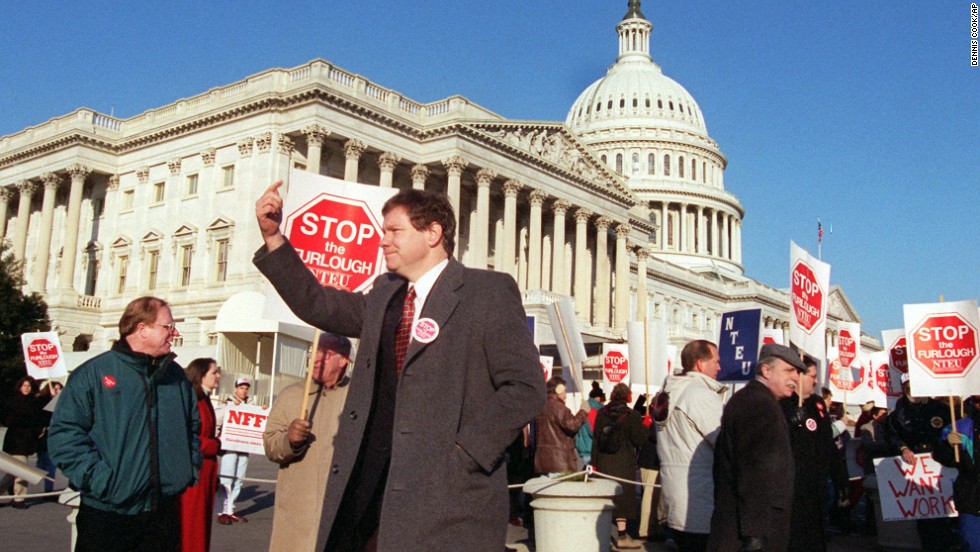The night of November 14, 1995 was supposed to be a victory for the Republican-controlled Congress. After passing a budget that would fund the government and decrease government spending, the Republicans felt confident that they averted a shutdown. However, that was not the case. By the time the budget made its way to the desk of Democratic president Bill Clinton, Clinton refused to sign the bill to fund the government. By refusing to sign the budget, parts of the government shut down. This led to protests by government employees, since they were not given their paychecks from the government.

Clinton wanted to increase funds for Medicare, Medicaid, education, and preserving the environment.1 The Republicans, though, wanted the opposite. By refusing to increase funding for Medicare, Medicaid, and preserving the environment, Clinton vetoed the budget and held negotiations to reach a compromise. However, Clinton had an issue with one of the Republican leaders he was meeting with, House Speaker Newt Gingrich. Before the shutdown, Clinton and Gingrich attended the funeral of Yitzhak Rabin, the Prime Minister of Israel. During the flight, Gingrich was told to sit at the back of the plane. It was perceived by others that Gingrich tried to use the shutdown as a form of vengeance against President Clinton. Although Gingrich felt angry at Clinton for the event on the flight, it did not affect the ongoing negotiations. After holding talks with Congress for five days, Congress passed a continuing resolution, which kept the government funded until December. Clinton signed the resolution on November 19, 1995, ending the five-day shutdown. After the resolution was signed, Congress was in a race against time to prevent another shutdown. Gingrich, however, thought to use this time to bash the President. During this period, Speaker of the House Newt Gingrich voiced his disagreements with President Clinton on the budget. By doing this, Gingrich made a tactical mistake by appearing too eager to shut down the government again.2 On December 16, 1995, Congress wanted to pass a second continuing resolution to give themselves more time to put the budget together. Clinton soon vetoed the resolution, thus sending the government into another shutdown. Both Congress and President Clinton found themselves back at the drawing board again.

President Clinton and Congress met on December 29, 1995, to compromise on a budget. During this time, the country was getting ready for the presidential elections. Republicans sought to use this shutdown as a weapon against Clinton’s failed policies. The negotiations continued until January 1996. On January 5, 1996, protests had erupted outside the Capitol. Government workers were demanding the end of the government shutdown, so they could get paid. Republicans held a press conference about the negotiations. They argued that they were trying to reduce government spending on federal programs, whereas Clinton wanted to increase spending for those programs. In some sense, Republicans thought that the amount of federal spending was one of the bones they had to pick with Clinton.3 By January 6, 1996, a compromise was met and President Clinton agreed to sign the budget bill, thus ending the twenty-one-day shutdown.

Although the shutdown was over, there were some benefits for both political parties. The Democrats and the Republicans made some gains after the 1996 presidential election. Democrats gained a few seats in the House of Representatives. Republicans, on the other hand, gained two seats in the Senate and kept control of Congress. House Speaker Newt Gingrich, however, had his political reputation damaged because of the disagreements with President Clinton over the budget. President Clinton’s job approval ratings were generally above the 50% mark after the shutdown in 1996 and he cruised to a re-election victory over his Republican opponent, Senator Bob Dole, in the fall of that year.4
- David J. Maraniss, The First Term. In Presidents: A Reference History (Detroit: Charles Scribner’s Sons, 2002), 626. ↵
- Kessler Glenn, “The Fact Checker: Lessons from the government shutdown of 1995-96,” The Washington Post no.1 (February 2011): 1. ↵
- George F. Will, “Republicans as Red Sox: The 1995 government shutdown reduced the importance of GOP control of Congress,” Newsweek no. 1 (October 1998): 92. ↵
- Frank Newport, “More in U.S. Say Shutdown Is About Politics Than Principle,” Gallup Poll Briefing no. 1 (2013): 1. ↵



58 comments
Yahaira Martinez
I believe the reason i was so drawn to this article was because of the familiarity of headlines from the recent news. I’m not too politically savvy and i don’t really understand how a government shutdown occurs or why it even happens, but after the one that occured recently i gained a little insight at who really is affected at all this by reading some articles and watching some videos. And in my opinion it is very upsetting to find out that this has occurred more than once and that the people paying for it are not even the people responsible for it.
Peter Coons
This is a prime example of how to handle a budget among politicians. Clinton, despite his infamous affair, was an excellent president. Much like how the Obama administration would become bogged down in a Republican controlled congress, Clinton had few options on how he could effectively govern and pass legislation. His refusal to sign two bills and force both aisles to compromise was an amazing tactic. Frankly, I think it should be used more often in order to ensure the American people benefit the most from a budget, and not just one political party.
Robert Flores
pretty good article. it is unfortunate that the republicans did not want to increase funds for medicaid. That would of helped out a lot of people. I do not really understand how people thought gingrich purposely shut down the government to get back at clinton for making him sit in the back of the plane. I think he would want to get paid for the work he does especially around christmas.
Alexandra Lopez
As the most famous line of all times says, “history repeats itself”. It is truly astonishing how similar crisis occur today. This is a very interesting topic to read about. There’s always so much controversy with the government, it’s not even funny. Not only are government officials effected by this, but nearly everyone is. It’s surprising how this has happened before, our government could’ve thought back to this event and provided some ways to avoid or prevent it from happening again.
Luis Morales
This was an interesting article. It has always fantasied me how something so small, like being put in the back of a plane, can cause so much chaos between the branches of the government. When the government shuts down, this event affects everyone. I also find it interesting that we face the same issues today that we faced in the past. What seems unfair is that when the government shuts down, it is not the politicians who are affected, but the government employees.
Constancia Tijerina
Before reading this article, I was not aware of this twenty one day government shutdown During Clintons campaign. I found this article to be both intriguing and relatable in consideration of how in today’s office, which is Donald Trump, and how much it relates to how much is going on within the government in the Republican party. Its always refreshing to have both interesting facts and humor both within an article, especially since this is a political article. Over all u believe this article was written fairly well.
Jose Figueroa
Too often, politics comes down to something other than it was originally meant for. Rather than focusing on getting the government shutdown solved, Clinton and Newt had a childish debate to settle that further delayed the progress. I think it is unfair that government workers are the ones mainly impacted by this rather than the politicians themselves. Even recently, there was a short shutdown.
Caroline Bush
Interesting article! When Government shut down occurs it effects everyone so its important to learn from past shutdowns so we can prevent future ones. I though it was interesting how even today we face the same problems that we did back than, and at the end of the day It still results in a government shutdown. If I had to nitpicks I would say that you could have made the extreme situation of a government shutdown more prevalent. Overall this was a really interesting topic and a good article.
Erin Vento
This article was really well written and gave good insight into why the shutdown happened and what happened during the shutdown. It’s a good article to read especially right now, considering everything that’s happening in the government. I really liked how parts of the article was kind of humorous when it talked about the tensions between President Clinton and Gingrich and why Gingrich might’ve wanted to capitalize on a government shutdown.
Fumei P.
I chose this article because it seemed relevant to what the government shutdowns happening now. The parties have switched positions, with an GOP candidate in power, however the outcome was still the same. Two sides unable to come to an agreement, ensuing furlough and thousands of government working left working with no wages, and technically no employment. In this article it made it seem as though vengeance or pettiness was responsible for the government shutdown.